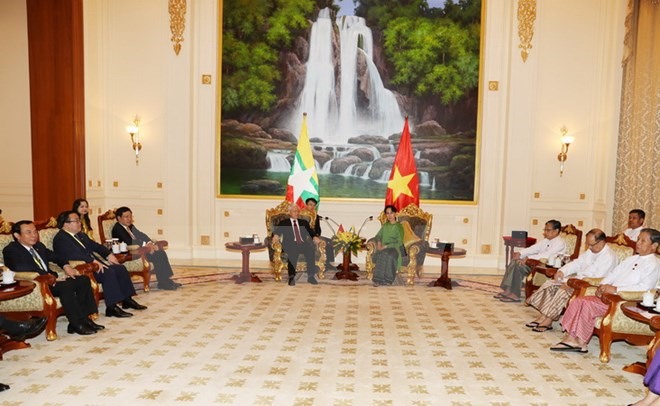 Politics & Law
Politics & Law

Việt Nam and Myanmar issued a joint statement on their comprehensive cooperative partnership on the occasion of Party General Secretary Nguyễn Phú Trọng’s State visit to Myanmar from August 24 to 26.
 |
| Việt Nam and Myanmar issued a joint statement on the comprehensive cooperative partnership forged during Party General Secretary Nguyễn Phú Trọng’s State visit to Myanmar from August 24 to 26.– VNA/VNS Photo Tri Dung |
HÀ NỘI – Việt Nam and Myanmar issued a joint statement on the comprehensive cooperative partnership forged during Party General Secretary Nguyễn Phú Trọng’s State visit to Myanmar from August 24 to 26.
The statement says that at bilateral talks and meetings, Vietnamese and Myanmar leaders shared the view that the State visit by General Secretary Trọng is a historic milestone in the two countries’ relations.
They expressed their delight at the rapid growth of traditional friendship and multifaceted co-operation in recent years, and agreed to promote bilateral co-operation between the countries’ parties, parliaments, governments and peoples.
On the basis of the growing bilateral ties and new developments in the region and the world, the leaders agreed to establish a comprehensive cooperative partnership between Việt Nam and Myanmar.
This would strengthen the five co-operation pillars of bilateral ties: political relations; defence and security co-operation; economic co-operation; cultural and social co-operation, people-to-people exchange, and other fields of shared concern; and regional and international co-operation.
With the newly established comprehensive co-operative partnership, the two sides agreed to enhance political ties through mutual visits and meetings at all levels.
They agreed to bolster government-to-government co-operation and make efforts to improve bilateral co-operation in economy, culture and science and technology. To strengthen connectivity between the two economies, they pledged to prioritise co-operation in transport infrastructure and tourism while expanding links in agriculture and forestry, telecommunications and banking.
They also agreed on measures to improve the investment climate so as to encourage Vietnamese and Myanmar businesses to invest in each other’s markets. They agreed to step up investment and trade promotion and trade facilitation towards raising bilateral trade to US$1 billion as soon as possible.
Party General Secretary Trọng affirmed that he would encourage Vietnamese firms to invest in potential areas in Myanmar such as energy, telecommunications and infrastructure.
President Htin Kyaw recognised the contribution by Việt Nam’s investment projects in Myanmar for local socio-economic development, and reiterated that his country would create optimal conditions to ensure interests of Vietnamese businesses in his country.
The two sides also agreed on fostering co-operation in information and communications technology and telecommunications.
The two leaders shared views on regional peace and security issues of mutual concern and vowed to boost bilateral security and defence co-operation through the sharing of information and experience, bringing into play existing co-operation mechanisms, and considering the establishment of defence policy dialogues and a joint working group between the two defence ministries.
They also applauded effective implementation of bilateral security dialogue mechanisms and agreed to reinforce security co-operation, including working together to build and complete legal frameworks for joint activities in fighting crime.
They noted with satisfaction good coordination and co-operation between the two countries at regional and international forums like ASEAN, the United Nations and the Non-Aligned Movement.
General Secretary Trọng appreciated Myanmar’s readiness to support Việt Nam’s candidacy for non-permanent membership of the UN Security Council for 2020-2021.
Both sides welcomed the continuation of co-operation in the sustainable and effective use of the Mekong River’s water resources, which they said was important to Mekong countries, including Việt Nam and Myanmar, as well as to the connectivity, community-building, stability and development of ASEAN.
They reiterated their commitment to maintaining and promoting peace, security and stability in the region, to resolving disputes by peaceful means, not using force or threatening to use force, and complying with broadly recognized principles of international law, including the 1982 UN Convention on the Law of the Sea.
They also reiterated their support for the full and effective implementation of the Declaration on the Conduct of Parties in the East Sea and the early finalisation of a code of conduct (COC) for the East Sea on the basis of the already approved framework. — VNS




